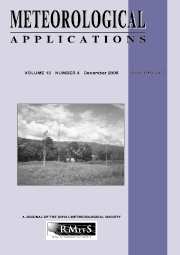Article contents
Tropical storm impact in Central America
Published online by Cambridge University Press: 22 February 2006
Abstract
In this study of tropical storm impacts in Central America, the relationship between physical variables (available in ‘real time’) and damage is explored, and a simple tool for early approximate evaluation of the impact is developed. Land track and energy dissipation appear as the most interesting parameters that modulate the hurricane impact. Because of the difficulty of attaching a monetary estimate to the damage caused in a large number of cases (as is required in a statistical approach), an ‘Impact Index’ based on the logarithm of casualties is introduced. Thereafter, within a subset of events in which damage in monetary terms is known, a rough link between damage and the Impact Index is derived.
Shortly after a new event, as soon as land track and energy dissipation are known, either by means of an empirical equation or using a contour graph, the Impact Index may be determined. Another empirical equation allows a rough estimate of damage in monetary units, but because this estimate is based on a limited number of cases, it must be treated with caution. The methodology is tested for a small set of independent cases.
Vulnerability to tropical cyclones depends not only on natural factors but also on sociopolitical conditions. A coupled sociological and environmental approach is believed to be the best way to improve the early impact estimate methodology.
Keywords
- Type
- Research Article
- Information
- Copyright
- 2006 Royal Meteorological Society
- 11
- Cited by


